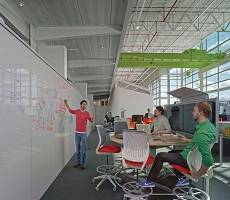July 22, 2014
BCO study finds office remains the best place to do business
 The challenge for the typical office is that it is meant to satisfy a broad range of individuals and a variety of working practices; which means what some may describe as a distracting open-plan layout, others would view as a busy collaborative workspace. These conflicts are highlighted in a new study by the British Council for Offices (BCO), Morgan Lovell and Hatch, which surveyed 2,000 UK office workers’ working conditions, attitudes and expectations. For example while over two thirds were critical of the distractions of the open-plan office, nine out of ten employees believe that support from colleagues enhances their wellbeing. Putting aside the open-plan debate, the study espouses the continued importance of the office as the best place to do business and comes up with three key starting points to help employers create a culture of wellbeing: care; control and collaboration. (more…)
The challenge for the typical office is that it is meant to satisfy a broad range of individuals and a variety of working practices; which means what some may describe as a distracting open-plan layout, others would view as a busy collaborative workspace. These conflicts are highlighted in a new study by the British Council for Offices (BCO), Morgan Lovell and Hatch, which surveyed 2,000 UK office workers’ working conditions, attitudes and expectations. For example while over two thirds were critical of the distractions of the open-plan office, nine out of ten employees believe that support from colleagues enhances their wellbeing. Putting aside the open-plan debate, the study espouses the continued importance of the office as the best place to do business and comes up with three key starting points to help employers create a culture of wellbeing: care; control and collaboration. (more…)






 In the latest copy of the Workplace Insight newsletter available to view
In the latest copy of the Workplace Insight newsletter available to view 
 The UK’s public sector spends almost twice as much on outsourced services as the country’s private sector, according to research from the
The UK’s public sector spends almost twice as much on outsourced services as the country’s private sector, according to research from the 
 The familiar sight of companies scrabbling to define a standard global technology format on their own terms is evident with the announcement of yet another consortium intent on becoming the de facto standard for the Internet of Things (IoT). The
The familiar sight of companies scrabbling to define a standard global technology format on their own terms is evident with the announcement of yet another consortium intent on becoming the de facto standard for the Internet of Things (IoT). The 











July 16, 2014
Three ways in which politicians display their ignorance of the workplace
by Mark Eltringham • Comment, Facilities management, Flexible working, Technology, Workplace, Workplace design
(more…)